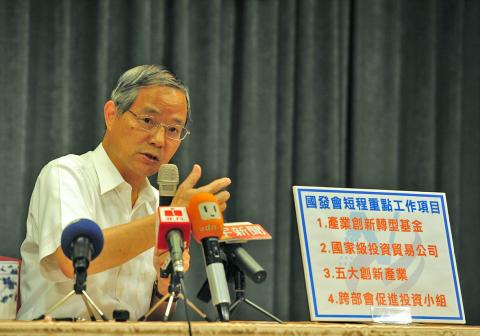The National Development Council (NDC) yesterday unveiled several short-term measures aimed at stimulating the economy through private investment by establishing an equity fund and a trading company to help firms expand, innovate and upgrade.
“Unlike past practices, the council and other government agencies will take the initiative and lend a helping hand wherever they spot worthy investment opportunities,” National Development Council Minister Chen Tain-jy (陳添枝) told a news conference in Taipei.
The council plans to establish an equity fund of NT$100 billion (US$3.06 billion) under the National Development Fund and take shares in promising firms through capital injection, Chen said.

Photo: Wang Yi-sung, Taipei Times
The equity fund would not vie for management rights, but would limit its role to pure capital investment and would exit once it achieves its goal, he said.
The planned fund differs from the National Development Fund in that the latter functions like a venture capitalist and focuses on business start-ups alone, Chen said.
Private investment is a GDP component the government can undertake to achieve lasting benefits, he said.
During the presidential campaign, President Tsai Ing-wen (蔡英文) pledged to promote biomedicine, “green” technology, “smart” machinery, national defense and building Taiwan into an Asian “Silicon Valley.”
Firms with plans to increase job opportunities would win favorable considerations, but that is not a necessary requirement, Chen said.
The planned trading company is to be capitalized at NT$10 billion, drawn from the public and private sectors, to help create and integrate investment opportunities for local companies, Chen said.
He said it would be different from Singapore’s sovereign wealth funds in that those focus on wealth management and help support social welfare with their profits.
The company is part of the government’s “new southward policy” — an attempt to guide private investment away from China toward Southeast Asian countries to reduce economic dependence on China and diversify investment risks.
The nation’s economy is in need of structural reform, the council said, adding that it would announce later how it plans to help diversify export products and destinations.
An overconcentration on a few sectors and technology devices have made Taiwan vulnerable in times of unfavorable technology cycles, Chen said.
The council would invite interested parties from the private sector to join the equity fund and the trading company, Chen said, adding that details of the two measures are not finalized.
Officials from the council and technology and economic ministries are to visit companies around the nation to learn their needs and come up with solutions, rather than wait and see what is needed as was done in the past, Chen said.

A magnitude 7.0 earthquake struck off Yilan at 11:05pm yesterday, the Central Weather Administration (CWA) said. The epicenter was located at sea, about 32.3km east of Yilan County Hall, at a depth of 72.8km, CWA data showed There were no immediate reports of damage. The intensity of the quake, which gauges the actual effect of a seismic event, measured 4 in Yilan County area on Taiwan’s seven-tier intensity scale, the data showed. It measured 4 in other parts of eastern, northern and central Taiwan as well as Tainan, and 3 in Kaohsiung and Pingtung County, and 2 in Lienchiang and Penghu counties and 1

A car bomb killed a senior Russian general in southern Moscow yesterday morning, the latest high-profile army figure to be blown up in a blast that came just hours after Russian and Ukrainian delegates held separate talks in Miami on a plan to end the war. Kyiv has not commented on the incident, but Russian investigators said they were probing whether the blast was “linked” to “Ukrainian special forces.” The attack was similar to other assassinations of generals and pro-war figures that have either been claimed, or are widely believed to have been orchestrated, by Ukraine. Russian Lieutenant General Fanil Sarvarov, 56, head

FOREIGN INTERFERENCE: Beijing would likely intensify public opinion warfare in next year’s local elections to prevent Lai from getting re-elected, the ‘Yomiuri Shimbun’ said Internal documents from a Chinese artificial intelligence (AI) company indicated that China has been using the technology to intervene in foreign elections, including propaganda targeting Taiwan’s local elections next year and presidential elections in 2028, a Japanese newspaper reported yesterday. The Institute of National Security of Vanderbilt University obtained nearly 400 pages of documents from GoLaxy, a company with ties to the Chinese government, and found evidence that it had apparently deployed sophisticated, AI-driven propaganda campaigns in Hong Kong and Taiwan to shape public opinion, the Yomiuri Shimbun reported. GoLaxy provides insights, situation analysis and public opinion-shaping technology by conducting network surveillance

‘POLITICAL GAME’: DPP lawmakers said the motion would not meet the legislative threshold needed, and accused the KMT and the TPP of trivializing the Constitution The Legislative Yuan yesterday approved a motion to initiate impeachment proceedings against President William Lai (賴清德), saying he had undermined Taiwan’s constitutional order and democracy. The motion was approved 61-50 by lawmakers from the main opposition Chinese Nationalist Party (KMT) and the smaller Taiwan People’s Party (TPP), who together hold a legislative majority. Under the motion, a roll call vote for impeachment would be held on May 19 next year, after various hearings are held and Lai is given the chance to defend himself. The move came after Lai on Monday last week did not promulgate an amendment passed by the legislature that